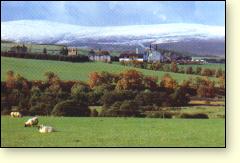
 |
|
Location: Ballindalloch, Banffshire AB37 9DB
Roads: Off the B9008, 4 miles from Ballindalloch
Hours: 10am - 4pm, Mon - Sat; 12.30 - 4.00 pm Sun
July - August open until 6.00pm daily
Reception centre, shop, coffee shop
Explanation boards in French, German, Italian, Spanish and Japanese
Phone: 01542-783220
|
Such was the reputation in the early 1800s of the illicit whisky produced in the Livet glen that it was sought by everyone in preference to any of the legally produced kind. There were over 200 unlicensed stills operating in Glenlivet at the time. What chance did the Excise have of convincing people of the immorality of smuggling if King George IV himself was continuously kept in good supply of illicitly produced Glenlivet whisky?
When the Excise Act was passed in 1823, a scramble of new distillery-building – 79 of them – got under way but George Smith’s application for a licence was the first to be granted. It was a fact that came in useful nearly 60 years later when his company’s product was challenged for the right to be regarded as the Glenlivet whisky. When the smugglers first ‘went legal’ there was unrest and some violence. Several distilleries were burned down and Smith himself reckoned that the pair of pistols that had been presented to him by the Laird of Aberlour saved his life on more than one occasion.
With whisky from the parish in such demand, other distilleries were permitted to hyphenate the word ‘Glenlivet’ on to their main names as an attention-getter. Most of them still produce excellent whisky but have dropped the extra name, preferring to attract attention to their own exclusive distillery titles.
The Smiths were Jacobites and supported the claims of Bonnie Prince Charlie to the British throne. Their real name was Gow but, in the bitter aftermath of the final Rebellion and Culloden, they adopted the less distinctive name of Smith for the sake of safety. They were farmers and illicit distillers – just like their neighbours around them – and when George Smith moved to Drumin farm in Glenlivet in 1817 he continued to distil without a licence.
His landlord, the Duke of Gordon, knew what was going on but he himself was about to play his part in revolutionising whisky production in Scotland. In 1820 he made a speech in Parliament which led directly to the Government’s change in thinking that was reflected in the Excise Act of 1823. Once this was in place, he gave every assistance to Smith in the building of his legal distillery.
From 1849 Smith also operated a distillery called Delnabo, near Tomintoul, which had been built in the 1830s. When his company moved to the present distillery site at Minmore in 1858, both Drumin and Delnabo were closed and dismantled.
The malt is centrally prepared but several kinds – some lightly peated, some more heavily peated – are used to give better dimension to aroma and texture. The old floor maltings are now just about all that is left of the original Minmore distillery; they were last used in 1966. The water is a mix of hard and soft. Since 1978 there have been four pairs of stills in operation.
The Whisky
The Glenlivet manages to show great finesse of aroma and weight yet delivers quite full, succulent, soft flavour. It is usually fruity, sherryish and sweet, gently smoky. The official releases are at 12, 18 (in the UK and USA) and 21 years old but, for such a widely popular and important malt, there is a vast choice of vintages going back to 1940 and pretty well every age, from 12 to 25 years old, from several independents.
Source of water
Unknown